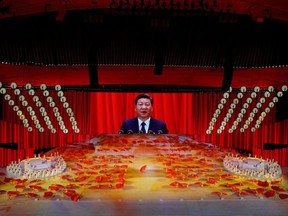Dyer: Communism has held back China, despite three-decade growth spurt
The Chinese Communist Party is celebrating the centenary of its foundation on Thursday, and most people in China accept the origin myth that justifies its dictatorial rule.

Article content
The Chinese Communist Party is celebrating the centenary of its foundation on Thursday, and most people in China accept the origin myth that justifies its dictatorial rule. China was a horrendously impoverished and unequal society in 1921, the official line says, and owes its current prosperity and freedom from foreign rule to the Communist revolution of 1949.
The implication is that without the Communist revolution China would still be poor and vulnerable to foreign meddling. But Japan and Korea, which share the same basic East Asian culture, have per capita incomes three or four times higher than China’s, and they are also democracies.
Then why is anybody celebrating the 100th anniversary of the foundation of the Chinese Communist Party (CCP)? Because it’s the victors who write the history, that’s why.
When the Communists took power in China in 1949, they should have enjoyed the same decades-long burst of growth that the Soviet Union experienced after the end of the Russian civil war in 1920. The raw material for that kind of explosive growth was available in both countries: a large peasant population ripe to be transformed cheaply into an industrial working class.
And the growth had nothing to do with Communism: the same happened in Britain in 1850-1880, the United States about two decades later, and Japan in 1950-1980.
So why didn’t it happen in China in the ’50s, ’60s and ’70s? Step forward the “Great Helmsman,” Mao Zedong.
The trouble with Mao was he really believed the sacred books. Russian Communists talked about “New Soviet Man” as a Platonic ideal. Mao spent 25 years trying to create a Chinese version.
That led to 25 years of political upheaval, bloodshed, famine and chaos: tens of millions were killed needlessly, and at the end China was just as poor as ever. Mao died in 1976, and it was 1980 before more sensible colleagues gained firm control of the CCP and began building a modern economy in China.
By Japan and South Korea were coming to the end of their three-decade spurts.
China has now reached the end of its own three decades of high-speed growth, but because the three previous decades were wasted, it still has a GDP per capita only a third or a quarter of that in Japan or South Korea — or Taiwan.
What was the alternative to the Maoist disaster? A Nationalist victory in the civil war, presumably, and how would that have worked out?
The Kuomintang (Nationalist) Party, which still clung to power in Taiwan, was deeply corrupt and very oppressive in the 1950s and ‘60s. A non-Communist China would have been the same sort of ramshackle dictatorship in that era, but the Nationalists would have started growing the Chinese economy right away. It’s what they did in Taiwan.
Over time the Taiwanese economy blossomed, the island’s people became educated, and eventually, in the 1980s, the autocrats were peacefully replaced by democratically elected governments. Why do people find it hard to believe that the same thing would have happened in a Nationalist-ruled China?
That hypothetical democratic China would now bestride the world like a colossus. Communist rule gave China the second-best outcome economically, and also lumbered it with a crude dictatorship. Will it remain that way forever?
The prevailing wisdom is that most people will put up with the dictatorship so long as the CCP delivers constantly rising prosperity. But China now has a pseudo-capitalist economy, including a welfare state that provides even less support to the under-class than the American one.
That makes the regime very vulnerable if there is a bad recession, which happens from time to time in capitalist economies. Moreover, under Xi Jinping, the CCP is stuck with another president-for-life, which tends to end badly everywhere. The CCP could rule for another generation, or it could be gone in less than a decade.
Gwynne Dyer is an independent journalist based in London, England.
Postmedia is committed to maintaining a lively but civil forum for discussion. Please keep comments relevant and respectful. Comments may take up to an hour to appear on the site. You will receive an email if there is a reply to your comment, an update to a thread you follow or if a user you follow comments. Visit our Community Guidelines for more information.